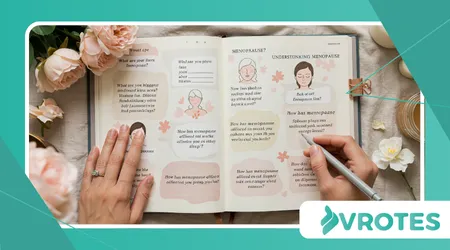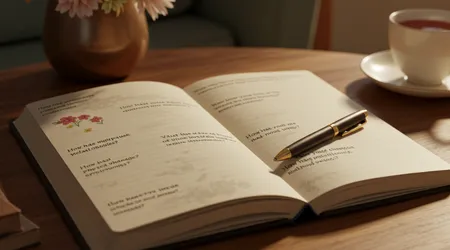Journaling Prompts to Understand Your Menopause Emotions

Journaling prompts can be a lifeline for women navigating the emotional turbulence of menopause, a transformative phase often shrouded in silence.
Menopause isn’t just hot flashes or night sweats it’s a profound shift in identity, emotions, and self-perception.
For many, it feels like sailing uncharted waters, where waves of joy, grief, or frustration crash without warning. Writing offers a safe harbor to process these changes, fostering clarity and resilience.
Research from 2018 shows journaling reduces anxiety and depressive symptoms, boosting resilience after just one month.
This article explores how journaling prompts can help women understand and embrace their menopause emotions, offering practical tools to thrive. Why not pick up a pen and chart your own course through this journey?
Menopause is a deeply personal transition, yet societal narratives often reduce it to physical symptoms, leaving emotional complexities underexplored. Journaling bridges this gap, allowing women to articulate feelings that might otherwise feel chaotic or suppressed.
By engaging with journaling prompts, you create a dialogue with yourself, uncovering insights that empower emotional growth. This practice isn’t about perfection it’s about honesty, reflection, and self-compassion.
Whether you’re grappling with mood swings or rediscovering your passions, writing can transform confusion into clarity. Let’s dive into how journaling prompts can guide you through this season with purpose and grace.
Why Journaling Matters During Menopause
Menopause can feel like an emotional labyrinth, with unexpected turns of anger, sadness, or liberation. Journaling prompts provide structure, helping you map these feelings. Writing externalizes internal chaos, offering a mirror to reflect on your evolving self.
Studies suggest expressive writing enhances emotional regulation, grounding you amid hormonal shifts.
By putting pen to paper, you create space to process without judgment, turning raw emotions into meaningful insights. This practice fosters self-awareness, a vital tool for navigating menopause’s unpredictability.
Consider Sarah, a 52-year-old teacher who felt overwhelmed by irritability during perimenopause. Using journaling prompts, she explored triggers, discovering her frustration stemmed from unmet creative needs.
This revelation led her to join an art class, channeling her emotions into painting. Journaling isn’t just venting it’s a pathway to actionable change.
++ How to Manage Night Sweats Without Disrupting Sleep
It helps you identify patterns in your emotional landscape, like a cartographer mapping new terrain. For Sarah, it was a game-changer, revealing hidden desires.
The emotional weight of menopause can feel isolating, but journaling connects you to your inner wisdom. Unlike talking to others, writing offers unfiltered honesty, free from external expectations.
Journaling prompts encourage you to dig deeper, uncovering root causes of emotions like anxiety or joy. This process builds resilience, helping you face menopause with confidence.
Imagine your journal as a trusted friend who listens without judgment, guiding you toward self-discovery.

Crafting Effective Journaling Prompts for Menopause
Not all journaling prompts are equal effective ones spark introspection tailored to menopause’s unique emotional challenges.
Focus on prompts that explore identity, physical changes, and relationships. For example, “How have my priorities shifted during menopause?” invites reflection on evolving values.
Prompts should feel open-ended yet specific, encouraging honest exploration without overwhelming you. This balance fosters meaningful insights, crucial during such a transformative phase.
A well-crafted prompt like “What emotion surprised me this week, and why?” can reveal unexpected feelings, like newfound confidence or grief. Clara, a 49-year-old nurse, used this prompt and uncovered joy in her newfound assertiveness.
Also read: Top 7 Calcium-Rich Foods to Protect Bone Health in Menopause
Such discoveries empower women to embrace menopause as a time of growth. Journaling prompts act like keys, unlocking doors to emotions you might not otherwise confront, fostering clarity and strength.
Experiment with different prompt styles reflective, imaginative, or gratitude-focused to suit your mood. A prompt like “Write a letter to my younger self about menopause” can heal past fears.
Vary your approach to keep journaling fresh and engaging. This flexibility ensures the practice remains a vibrant tool for emotional exploration, helping you navigate menopause’s complexities with curiosity.
Sample Journaling Prompts for Emotional Clarity
Below are journaling prompts designed to illuminate menopause emotions, each paired with a purpose to guide your reflection:
| Prompt | Purpose |
|---|---|
| What emotion feels most overwhelming today, and what triggered it? | Identifies intense feelings and their sources. |
| How has menopause changed my sense of self? | Explores shifts in identity and self-perception. |
| What brings me joy now compared to ten years ago? | Highlights evolving sources of happiness. |
| Write a letter to my body, thanking it for its resilience. | Fosters gratitude and self-compassion. |
These prompts encourage deep reflection, helping you process complex emotions. For example, the letter to your body might reveal appreciation for its strength, shifting your perspective.
Regular use of such prompts builds emotional resilience, like strengthening a muscle over time. They guide you toward understanding menopause as a journey of growth, not loss.
Another powerful prompt is, “What fears about aging do I hold, and how can I reframe them?” This helps confront societal stigmas about menopause, fostering empowerment.
Read more: Low-Impact Cardio Workouts to Boost Heart Health After 50
Journaling about fears can transform them into opportunities for growth, like turning a storm into fertile rain. Try alternating prompts daily to maintain engagement and uncover new emotional insights.
Consistency matters set aside 10 minutes daily to journal, using these prompts to explore your emotional landscape.
Over time, patterns emerge, revealing how menopause shapes your emotional world. This practice becomes a compass, guiding you through the fog of hormonal changes with newfound clarity and purpose.
Integrating Journaling into Your Menopause Journey
Making journaling a habit during menopause requires intention but reaps profound rewards. Choose a medium paper or digital that feels natural. A cozy notebook can feel intimate, while an app suits on-the-go reflection.
Set a consistent time, like morning coffee or bedtime, to anchor the habit. This routine turns journaling prompts into a steady companion through menopause’s ups and downs.
Start small five minutes with one prompt daily builds momentum. Over time, increase depth, exploring prompts like “What strength have I discovered in menopause?” This approach keeps journaling manageable yet impactful.
Create a judgment-free space; your journal is for you alone. This freedom fosters honesty, crucial for processing menopause’s emotional rollercoaster.
Distractions can derail journaling, so carve out a quiet space a cozy corner or park bench. Reflect on how journaling makes you feel; acknowledging its benefits reinforces the habit.
For instance, noting reduced stress after writing can motivate consistency. By integrating journaling prompts into daily life, you cultivate a powerful tool for emotional clarity and resilience.
Overcoming Common Journaling Challenges
Journaling during menopause can feel daunting when emotions run high. Feeling “stuck” is common try free-writing for five minutes before using a prompt.
This loosens mental blocks, like clearing a foggy windshield. If emotions feel overwhelming, start with lighter prompts, like “What made me smile today?” to ease into deeper reflection.
Time constraints often hinder journaling. Keep a pocket-sized notebook handy for quick entries during busy days. Another challenge is self-criticism release the need for perfect prose.
Your journal is a safe space, not a literary masterpiece. If a prompt feels repetitive, switch to a fresh one, like “What’s a new dream for my future?” to spark inspiration.
Some women fear confronting intense emotions. A prompt like “What emotion am I avoiding, and why?” can gently guide exploration.
This gradual approach builds emotional courage, like wading into a pool before diving in. By addressing these challenges, journaling becomes a reliable ally in your menopause journey.

Journaling as a Tool for Empowerment
Journaling transforms menopause from a challenge into an opportunity for growth. Journaling prompts empower you to rewrite your narrative, embracing this phase with confidence.
By exploring emotions like grief or liberation, you uncover strengths you didn’t know you had. This process fosters self-compassion, a cornerstone of emotional wellness.
Consider menopause as a river journaling helps you navigate its currents. A prompt like “What new possibilities does menopause bring?” shifts focus to opportunity.
This mindset empowers you to view menopause as a season of reinvention, not decline. Journaling becomes a catalyst for embracing your evolving identity with courage.
Empowerment through journaling lies in its ability to clarify your voice. Prompts like “What do I want my legacy to be?” inspire vision.
By consistently engaging with journaling prompts, you cultivate resilience, self-awareness, and a renewed sense of purpose, making menopause a powerful chapter in your story.
Frequently Asked Questions
How often should I use journaling prompts for menopause emotions?
Aim for 5-10 minutes daily or 3-4 times weekly to build consistency and gain emotional insights without feeling overwhelmed.
Can journaling really help with menopause-related anxiety?
Yes, a 2018 study found journaling reduces anxiety and depressive symptoms, enhancing resilience within a month. It helps process emotions effectively.
What if I don’t know what to write?
Start with free-writing or a simple prompt like “What’s on my mind today?” to ease into deeper reflection without pressure.
Should I use the same journaling prompts repeatedly?
Vary prompts to keep journaling fresh, but revisiting favorites can deepen insights. Alternate reflective and creative prompts for balance.
Is digital or paper journaling better for menopause emotions?
It’s personal paper feels intimate, digital is convenient. Choose what feels comfortable and sustainable for your lifestyle and emotional needs.
